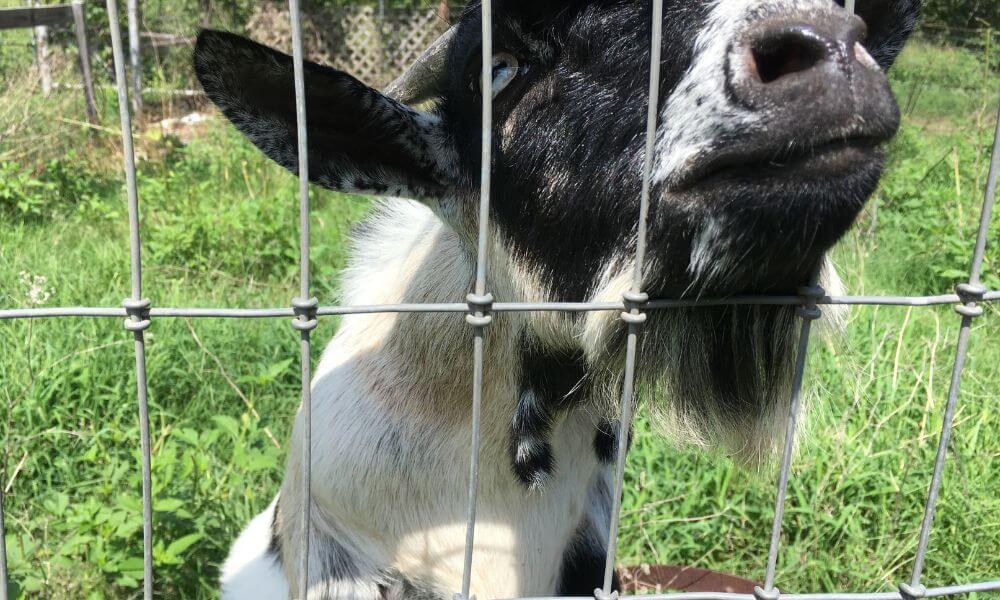Nigerian dwarf goats do not live especially longer or shorter lifespans as a result of their small stature.
There is sometimes a trend in the animal kingdom for smaller breeds of a species to live slightly longer- this is often true of dogs.
Nigerian dwarf goats may live a year or two longer than average, but not much more than that.

Are Nigerian dwarf goats good pets?
So, if they’re to be around for potentially a couple of decades, it’s best to learn as much about Nigerian dwarf as you can before committing to the long haul.
The simple answer is that yes, Nigerian dwarf goats make great pets.
They’re full of energy and very social animals, and love to play and have fun.
So, if that temperament matches what you’re looking for in a pet goat, you will get on very well with a Nigerian dwarf goat.
Nigerian dwarf goats need a fair amount of stimulation, as do most goats.
They are highly social creatures as all herd animals are, and, being ruminants, they are more like deer than sheep.
They like to spend their days roaming around in search of things to eat on a large pasture.
They also produce tasty milk which can be used to make a number of products.
Again, this will come down to a question of temperament; if you wish to have a lactating goat, you must be aware that you’ll need to milk it every day or it will become ill.
As the name implies, dwarf goats are smaller than ordinary goats.
They have been highly popular as a pet for this reason.
Nonetheless, they’re long-lived animals as far as pets go, so be aware of what you’re signing up for.
How big do Nigerian dwarf goats get?
The average Nigerian dwarf goat will be around 18 inches tall on average when fully grown.
Does may be a bit smaller, but the largest buck will not get much bigger than 20 inches tall.
They can weigh anywhere from 65-85 pounds, again with males usually weighing slightly more than females.
This, of course, is a healthy weight, and 15 to 20 years is a healthy age.
So, you’ll have to take the best possible care of them to help them reach this old age.
What do Nigerian dwarf goats eat?
As I mentioned, goats are ruminants.
Unlike sheep and cattle, who are grazers, they need a bit more variety in their diets.
If you want to give your Nigerian dwarf goat the longest possible life, you’ll need to carefully select its diet.
The main part of a Nigerian dwarf goat’s diet should be good quality hay or forage.
Because of their smaller size, they don’t require the high levels of protein present in something like alfalfa or legume hay.
Simple, good quality grass hay will do the trick.
Goats also need forage, which they like to roam around and find for themselves on their pasture.
This can be almost anything, as goats have a reputation for.
Mainly it will be leaves and even flowers from bushes, they also like to pull up roots and even eat twigs and branches.
A small amount of fresh fruit and vegetables is also important in any goat’s diet.
Again, Nigerian dwarf goats’ smaller size and weight means they will need only a very small amount, but it’s always good to include fresh plant food from your kitchen.
With the exception of a few things like avocados which can be toxic to goats, giving them some kitchen scraps or compost is a good way to get this into their diet.
If you are raising kids, they will have a slightly higher protein requirement for the first 6 to 8 weeks.
High protein grain is a great, easy way to deliver this.
Grains contain a number of minerals which are also vital for goat development.
Once they have reached full maturity, however, the amount of grain in their diet should be reduced, and you should be careful that adult goats in your herd aren’t eating the grain themselves.
Finally, obviously, Nigerian dwarf goats need a constant supply of fresh water.
If you are lucky enough to have a body of water on your property then you’ll be fine, if not you need to provide a good quantity of fresh, clean water every day.
If you follow these dietary requirements your Nigerian dwarf goats will live a long, happy life.
Nigerian dwarf goats, then, live about as long as most breeds do, perhaps ever so slightly longer.
The lifespan of a goat or indeed any domestic animal is dependent on how you care for it, though, so you must know what you’re getting into before setting up a goat herd.
If you do so, you’ll have a wonderful, energetic, happy family for many years to come.
